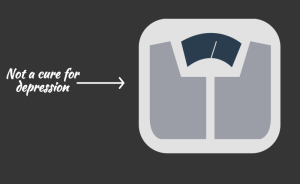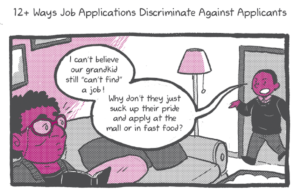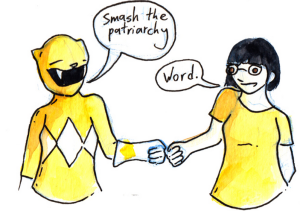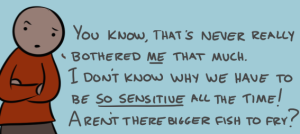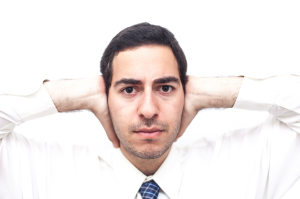“You know, you should really just lose weight,” the psychiatrist says to Caley.
I’m sitting in the counseling office with my sister, Caley, who is currently experiencing a difficult episode of depression.
Her sense of self-worth is low, to say the least, and she often says that she hates herself. Her abilities to function over the past six months have deteriorated so much that even her ability to even get out of bed is limited. And the energy it takes just to perform the basic tasks needed to stay alive, such as eating, can seem colossal when you’re struggling with depression.
She’s worked up the energy to leave the apartment and go to this appointment, using up all her day’s energy in one fell swoop just to get here.
And what she’s met with is degradation for her weight and the implication that if she could just lose weight, she’d be happy again.
The psychiatrist doesn’t even realize what impact her words have on Caley. Though she says them in a sincere attempt to help, even words said in kindness can be cruel.
What’s worse, the psychiatrist is not the only one.
Many of us have given similar advice to the people dealing with depression in our lives, not knowing how hurtful they could be.
So let’s break down some of the common reasons given for justifying such comments – and why they’re completely misguided, and then suggest some things you can do that may actually help someone with depression.
Shall we?
1. ‘It’s Proven That Obesity Is Related to Depression, So I’m Not Being Fatphobic by Suggesting Weight Loss’
Not so much, actually.
Studies tend to disagree on that fact, and even in those that do find a relationship between the two, such as this one, the link to depression varies based on sex, gender, and race.
In women, for instance, there is a positive link between depression (or thoughts of suicide) and weight. In men, however, the opposite relationship was found – meaning that the lower their weight was, the more likely they were to be depressed.
I don’t know about you, but to me what that’s saying is that it’s not fat itself that causes depression. Perhaps, instead, it’s something environmental – like cultural beauty standards playing a role and, I dunno, maybe the way our society treats fat people.
The point is: Depression isn’t something you can control, and it certainly isn’t something caused by being a certain weight.
Sometimes it can be from outside events, but other times it’s just that your neurotransmitters are messed up. Either way, it isn’t your fault.
You don’t need a reason to be depressed. Depression is not at all the same as sadness. And weight loss is not a cure.
Suggesting so is simply sad, upsetting, and rubs salt into the wounds of being depressed already.
2. ‘I’m Trying to Protect Them from Fatphobia – And Thereby Improve Their Depression’
It doesn’t work like that.
Yes, fatphobia exists. And yes, that sucks.
But the solution to that isn’t to push someone into losing weight. It’s to fight fatphobia. When you pressure someone and make them feel bad for how they look, you become part of the problem, not the solution.
What’s more, being made to feel ashamed of your weight is going to have the exact opposite effect that you’re looking for.
To quote the conclusions of this study, which investigated the experiences of 2944 people:
Our results indicate that rather than encouraging people to lose weight, weight discrimination promotes weight gain and the onset of obesity. Implementing effective interventions to combat weight stigma and discrimination at the population level could reduce the burden of obesity.”
Reading more into the study, it actually reports that those who don’t experience weight discrimination (and, PS, that’s what you’re doing when you tell someone they need to lose weight) actually lost weight over the course of the study.
So, if you’re actually legitimately looking to help your friend navigate fatphobia (a doubtful goal anyway, but whatever), the best thing to do is to keep your mouth shut – and actively work toward creating a world where other people do, too.
3. ‘Exercising and Eating Right Will Make a Depressed Person Feel Better’
It’s true that exercise releases endorphins and neurotransmitters that have been shown to help reduce depression.
Why, then, should we not tell people who are depressed to exercise?
Well, because it’s not that simple.
Here’s how it works: If depression has sapped your energy, you don’t have much energy to move around in general, let alone exercise. So that can lead to be gaining a lot of weight.
There’s no easy fix. Even if you want to lose weight, there are factors outside your control.
When you’re severely depressed, getting out and exercising is the last thing you’re able to do. But when this is explained, people just lower the bar: “Well,” they say, “maybe you can’t go jogging, but you can do yoga, or go for a walk in the parking lot.”
But that’s like lowering the bar from 50 stories high to three stories high. Sure, you lowered it, but when you’re battling to so much as stand up, it makes little difference.
What about the “eating right” claim?
Well, not only is there not as much evidence of that being helpful for depression, but eating in general is another thing that depression can make hard or even impossible without outside help.
You see, when you’re depressed, preparing a meal can be harder than ever. And I don’t mean you switch from being able to cook a four course meal to only being able to bake a casserole.
When you’re severely depressed, having the energy to even microwave a frozen meal can be about as much as you can manage. These fast and easy meals are rarely “healthy,” but sometimes they’re all you have to work with.
When people tell my sister to lose weight or criticize her for not eating healthy foods and exercising, they’re taking a product of her mental health and criticizing her for it in a way that makes her mental health even worse.
4. ‘I’ve Been Depressed Myself, and Losing Weight Really Helped Me Feel Better’
Depression is different for everyone, and so is what helps (and hurts) different individuals.
While weight loss, healthy eating, or exercise may have been your salvation, pushing it on someone else isn’t the miracle solution for them.
In fact, it may well make them feel worse – guilty for not having the energy to try this “one easy fix” you’re pushing, or even less comfortable in their skin than they already do.
If they ask, feel free to share your own story, but never push it on someone else – you could be doing more harm than good.
As I noted earlier, fatness in of itself isn’t actually related to depression, as found in this study.
Instead, it looks as though other factors related to being fat, such as genes and—oh hey—treatment by society are more likely to have the relationships with depression, rather than fatness itself.
The point here is that even if losing weight was helpful for you, fat isn’t actually related to depression on its own.
So on a large scale, losing weight probably isn’t going to be fixing most people’s depression.
5. ‘Being Depressed Sucks No Matter Your Weight – Why Are You Only Focusing on Fat People?’
Both Caley and I have been depressed on and off. Yet our experiences of depression from society have been very different.
One of the results of my depression was a severe lack of energy, leading me to skip meals and be underweight. Caley, on the other hand, has actually managed to keep eating – most of the time, at least. But, as we talked about earlier, the food she has energy to be able to access is mostly junk food, causing her to gain weight.
The way society has treated both of us as a result has been very different.
Caley was greeted with criticism and told if she could only lose weight, she wouldn’t be depressed anymore. I was greeted with plates of lovingly cooked food, not blamed for my weight loss, and never told that I would be happier if I could only gain weight.
The support I received helped me to open up to those around me and helped me with my depression. The criticism Caley has received has, conversely, pushed her to limit times with certain people or situations. It’s further cut her off from the world, and only furthered her self-loathing.
And that’s the critical difference.
6. ‘Damn It, I’m Just Trying to Help! Is It Really That Big of a Deal?’
Yes. Yes, it is a really big deal.
In fact, the hardest thing Caley says she faces from others is the common comment that if she would just do this one thing (that, incidentally, would make her lose weight), depression would go away.
Being told these things made Caley feel hurt and angry. Because – guess what – if it was that easy, she would have done it already.
What’s more, in order for you to know about a person’s depression means that they were open with you about their struggle. And that’s a really hurtful way to reply to someone who you’re trusting with that.
So How Can You Help?
Don’t feel helpless. If you know someone dealing with depression (which, considering one in ten people experience depression in their lifetime, you probably do), you really can help.
The biggest thing that you can do is just be there. My boyfriend helps me eat, which is why I’ve gained my weight back. And I, in turn, make sure that Caley’s getting regular meals.
Caley’s depression has dropped significantly since I started checking on her every day (she moved in with me so I could do so), just from having someone who cares about her around.
But you don’t have to let someone move in with you or cook food for them to help.
Just being a friend – calling and checking in every so often, hanging out, and being a non-judgmental presence – is really the best you can do.
And, of course, if they ask for it, help your friend get help.
It’s ironic that when you most need mental health help is when, due to the issues with energy, you’re least able to access it. Having a friend to help can mean the difference between getting help and continuing to struggle without supports.
We want to end with one hurtful thing that we hear not from others, but from ourselves: “You’ll never get better.”
Like many things depression will tell you, it’s not true.
As Caley says, “I tried and I tried, and it may have taken a freaking half a year, but I eventually found something that makes me feel a bit better. My meds. Believe it or not, it does get better. It just took a horribly long time for me. But it got better. There’s no shame in asking for help. That’s a big thing.”
And I wholeheartedly agree. Getting better is never predictable – but it’s also never impossible.
Hang in there.
[do_widget id=’text-101′]
Creigh Farinas is a Contributing Writer for Everyday Feminism. She’s a graduate student pursuing a Master’s degree in Speech Language Pathology and who already has a B.A. in Psychology and a post-baccalaureate in Communication Sciences and Disorders. Creigh is still learning more every day, and her sister Caley reads, edits, and approves everything that Creigh writes about disabilities. You can see more of Creigh and Caley’s writing at Autism Spectrum Explained.
Caley Farinas is a Contributing Writer for Everyday Feminism. She’s a recent graduate with a Bachelor’s in Public Health who writes about the effect society has on the “disabled.” Caley writes from her experience as an Autistic woman with dysgraphia and anxiety disorders. Because of these disabilities, it is hard for her to write and she gets assistance from her sister Creigh in writing/typing. That said, any words that you see attributed to her are her own, and she edits and approves anything her sister Creigh types. You can see more of Caley and Creigh’s writing on their website Autism Spectrum Explained and their Facebook page.
Search our 3000+ articles!
Read our articles about:
Our online racial justice training
Used by hundreds of universities, non-profits, and businesses.
Click to learn more


